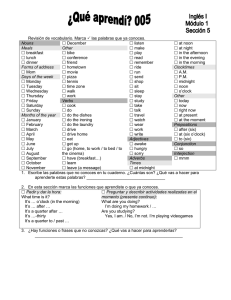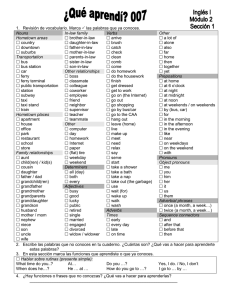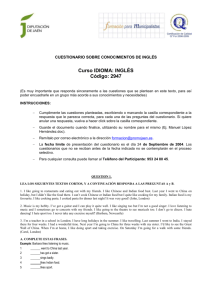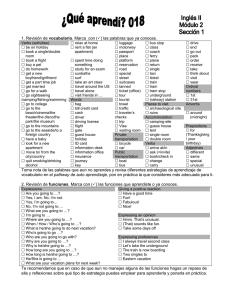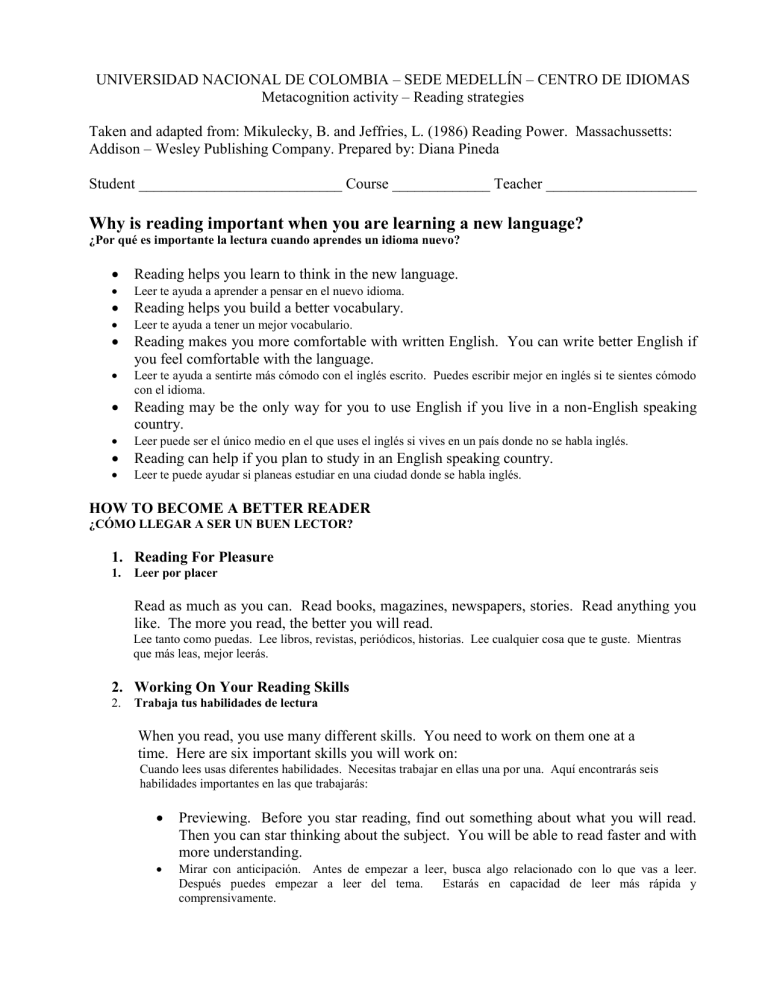
UNIVERSIDAD NACIONAL DE COLOMBIA – SEDE MEDELLÍN – CENTRO DE IDIOMAS Metacognition activity – Reading strategies Taken and adapted from: Mikulecky, B. and Jeffries, L. (1986) Reading Power. Massachussetts: Addison – Wesley Publishing Company. Prepared by: Diana Pineda Student ___________________________ Course _____________ Teacher ____________________ Why is reading important when you are learning a new language? ¿Por qué es importante la lectura cuando aprendes un idioma nuevo? Reading helps you learn to think in the new language. Leer te ayuda a aprender a pensar en el nuevo idioma. Reading helps you build a better vocabulary. Leer te ayuda a tener un mejor vocabulario. Reading makes you more comfortable with written English. You can write better English if you feel comfortable with the language. Leer te ayuda a sentirte más cómodo con el inglés escrito. Puedes escribir mejor en inglés si te sientes cómodo con el idioma. Reading may be the only way for you to use English if you live in a non-English speaking country. Leer puede ser el único medio en el que uses el inglés si vives en un país donde no se habla inglés. Reading can help if you plan to study in an English speaking country. Leer te puede ayudar si planeas estudiar en una ciudad donde se habla inglés. HOW TO BECOME A BETTER READER ¿CÓMO LLEGAR A SER UN BUEN LECTOR? 1. Reading For Pleasure 1. Leer por placer Read as much as you can. Read books, magazines, newspapers, stories. Read anything you like. The more you read, the better you will read. Lee tanto como puedas. Lee libros, revistas, periódicos, historias. Lee cualquier cosa que te guste. Mientras que más leas, mejor leerás. 2. Working On Your Reading Skills 2. Trabaja tus habilidades de lectura When you read, you use many different skills. You need to work on them one at a time. Here are six important skills you will work on: Cuando lees usas diferentes habilidades. Necesitas trabajar en ellas una por una. Aquí encontrarás seis habilidades importantes en las que trabajarás: Previewing. Before you star reading, find out something about what you will read. Then you can star thinking about the subject. You will be able to read faster and with more understanding. Mirar con anticipación. Antes de empezar a leer, busca algo relacionado con lo que vas a leer. Después puedes empezar a leer del tema. Estarás en capacidad de leer más rápida y comprensivamente. Asking questions as you read. This keeps your mind on what you read. Asking questions helps you pay attention. It also helps you to remember what you read. Hacer preguntas al tiempo que lees. Esto mantiene tu mente activa mientras que lees. Hacerte preguntas te ayuda a prestar atención. También te ayuda a recordar lo que lees. Guessing what new words mean. It takes too much time to look up every new word. And if you stop, you may forget what you are reading. Use the whole sentence or paragraph to guess words. Adivinar el significado de las palabras nuevas. Toma demasiado tiempo buscar cada palabra en el diccionario. Y si paras, puedes olvidar lo que estás leyendo. Usa la oración completa o párrafo para adivinar las palabras. Finding the topic and the main idea. The topic and the main idea let you know what is important. To find the topic and the main idea, ask two questions: What is this about? What does the writer want to say about this? Buscar el tema y la idea principal. El tema y la idea principal te ayudan a entender lo que es importante. Para encontrar el tema y la idea principal, hazte dos preguntas: ¿De qué se trata esto? ¿Qué quiere decir el autor de esto? Understanding patterns in English. A pattern is a way of putting ideas together. If you find the patter, you can understand more. You will also remember more. Entender los patrones en inglés. Un patrón es un modo de poner las ideas juntas. Si encuentras el patrón, puedes entender más. También recordarás más. Using signal words. Some words are like signposts on a highway. They tell you what direction the writer is going. And they help you to follow the writer’s ideas. Signal words also help you guess what you will read about. Usar palabras guía. Algunas palabras son como señales en una autopista. Ellas te dicen el sentido en el que el escritor va. Y te ayudan a seguir las ideas del escritor. Las palabras guía también te ayudan a adivinar sobre lo que vas a leer. 3. Learning To Read Faster 3. Aprender a leer más rápido Reading faster is very important because of the way your brain works. When you read slowly, your brain does not get enough information. You understand better when you read faster. Leer más rápido es muy importante por la forma en que trabaja el cerebro. Cuando lees despacio, tu cerebro no capta toda la información. Entiendes mejor cuando leer más rápido. 4. Learning To Think in English 5. Aprender a pensar en inglés You also need to work on understanding English sentences. Learn how to get the meaning of sentences. Find out how ideas follow each other in English. También necesitas trabajar en entender oraciones en inglés. Aprende a entender el significado de las oraciones. Encuentra cómo se encadenan las ideas en inglés. HOW TO READ FASTER ¿CÓMO LEER MÁS RÁPIDO? Why read faster? ¿Por qué leer más rápido? Reading faster helps you understand more. This may be surprising. But, in fact, your brain works better when you read faster. Try reading this: Leer más rápido ayuda a que entiendas más. Esto puede parecer increíble. Pero en realidad tu cerebro trabaja mejor cuando lees rápido. Ensaya lo siguiente: Many students are surprised the teacher tells them to faster. But they soon find out that they understand more that way. when read If you read slowly, you read one word at a time. You must remember many separate words. Soon you can get tired or bored. Si lees despacio, leerás palabra por palabra. Tienes que recordar muchas palabras separadas. Pronto te cansarás o aburrirás. But if you read faster, you can read groups of words together. Then you can think about ideas and not just single words. That is why you understand better and remember more. Pero si lees rápido puedes leer grupos de palabras juntos. Luego podrás leer grupos de palabras juntas. Después te darás cuenta que las ideas no son palabras aisladas. Por eso es que entiendes y recuerdas más. HOW TO THINK IN ENGLISH ¿CÓMO PENSAR EN INGLÉS? If you want to read English well, you must think in English. These exercises will help you. In each exercise, the last sentence is not finished. Below the exercise, there are four endings. Circle the best ending. As you work: Si quieres leer bien en inglés, tienes que pensar en inglés. Estos ejercicios te ayudaran. En cada ejercicio, la última oración no está terminada. En el ejercicio de abajo hay cuatro formas de terminar la oración. Encierra en un círculo la mejor. Mientras lo haces: 1. guess the meanings of new words. 2. try to understand the way ideas work together in English. 1. 2. adivina el significado de las palabras nuevas trata de entender la forma como trabajan las ideas juntas en inglés. Here is an example: Aquí hay un ejemplo: In the morning the language lab was full of people. Many students were waiting. Joe could not find a seat. He decided to come back later when the lab was. a. Closed. b. Busy. c. More crowded. d. Less crowded. Why did Joe decide to come back later? Because the lab was full. ¿Por qué decidió Joe venir más tarde? Porque el laboratorio estaba lleno. What is another word for “full”? Crowded. ¿Qué otro significado tiene “full”? Crowded. Joe wants a seat. So he must come back when the lab is not full. Joe quiere un lugar. Entonces tiene que regresar cuando el laboratorio no esté lleno. What is another way to say “not full”? Less crowded. ¿Qué otra manera hay para decir “not full”? Less crowded The correct answer is “d. less crowded.” La respuesta correcta es “d. Less crowded.” Try the following exercises. The underlined words may help you find the best ending. Realiza los siguientes ejercicios. Las palabras subrayadas te pueden ayudar a encontrar la mejor terminación. 1. Fruit is sweet, but candy is even a. nicer. b. Worse. c. Sweeter. d. Less sweet. 2. Vitamins are very important for the health of young children. If children don’t get enough vitamins in their food, they will a. get sick. b. be happy. c. get well. d. stay home 3. Some people are vegetarians. They do not eat any kind of meat. One special kind of vegetarian will not even eat a. vegetables. b. Carrots. c. Fruits. d. Eggs. 4. There are many kinds of coffee around the world. The Italians like their coffee strong and dark. Americans do not like very strong coffee. They prefer it a. stronger. b. Weaker. c. For breakfast. d. Black. 5. You can make tea from many kinds of plants and fruits. Some people drink tea from roses and other flowers. People also make tea from a. medicine. b. Coffee. c. Milk. d. Apples. 6. Chocolate is popular around the world. In some countries, people use it in main dishes such as chicken. In other countries, it is used in desserts such as ice cream, pudding, or a. breakfast. b. Soup. c. Salad. d. Cake.
